Despite concerns, Republican elections nominee heads for a vote
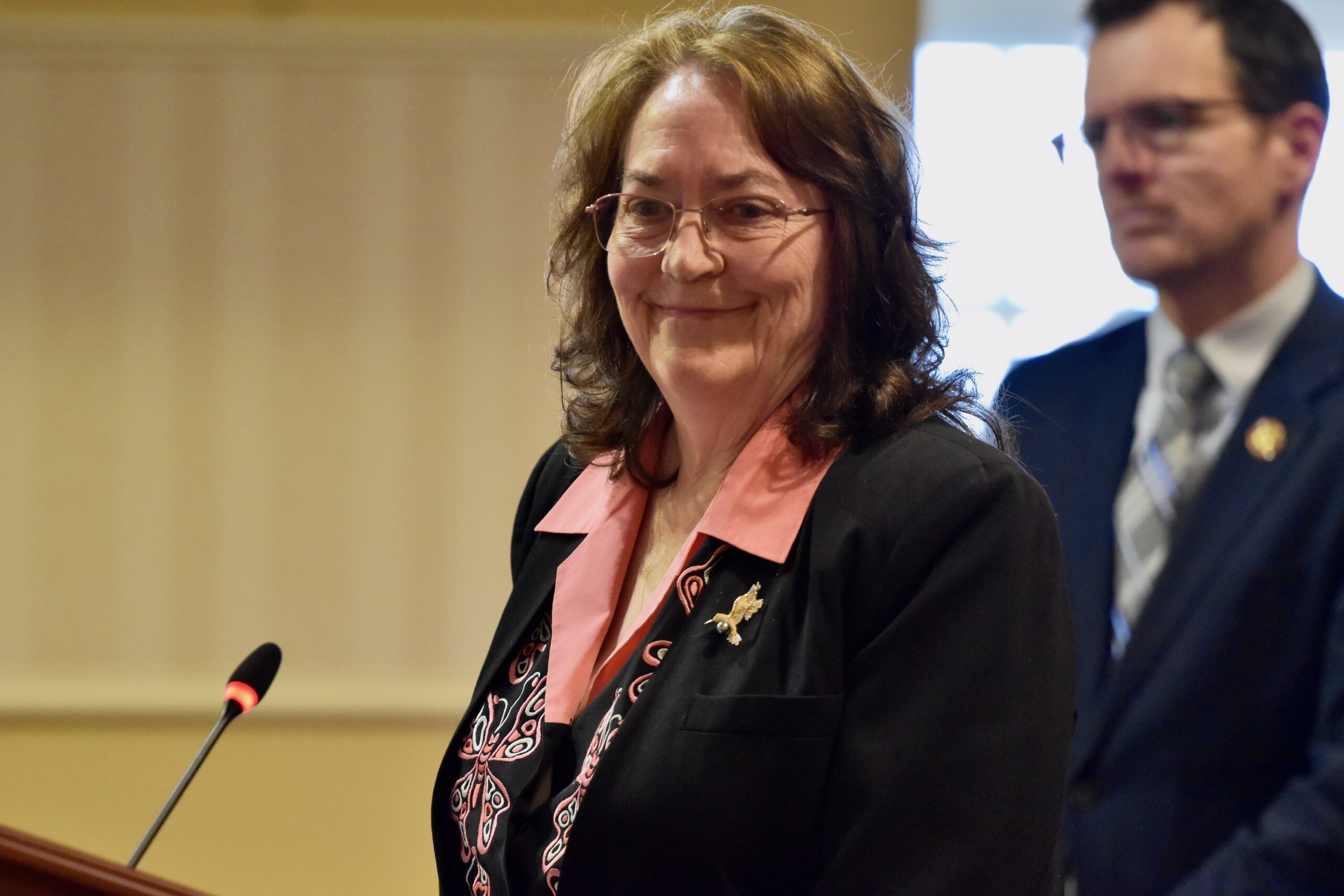
The Maryland Senate as early as this week could take up the stalled appointment of a Howard County woman to the Maryland State Board of Elections.
Diane Butler was nominated by the Maryland Republican Party to fill one of two vacancies on the panel. The Senate Executive Nominations Committee delayed a vote two weeks ago after one member of the committee asked for a pause because of comments made in emails and a social media post described as antisemitic.
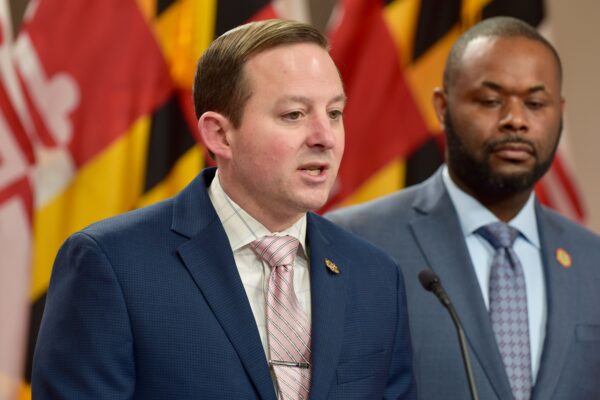
Senate President Bill Ferguson (D-Baltimore City) said a vote on Diane Butler, a Republican nominee to the state board of elections, will likely happen despite of concerns raised by some emails and a social media post brought up at her confirmation hearing. Photo by Bryan P. Sears.
It now appears that the committee and Senate Democratic leaders are prepared to move Butler to a vote, even as they are expressing some concerns.
“I think there were some Facebook posts and things that did express some concerns,” said Senate President Bill Ferguson (D-Baltimore City). “I think that there are different additional questions that are being asked to the nominee.”
Ferguson, speaking to reporters Friday, noted that Butler’s appointment is made by the Maryland Republican Party. As such, disqualifying her would be subject to a “high bar” standard.
“I think there would have to be significantly more information of concern to overcome that bar of potentially not moving forward,” Ferguson said.
Asked if the Executive Nominations Committee would likely vote on her nomination Monday, Ferguson said: “I presume that will be the case unless additional information comes forward.”
‘An appropriate choice for the state board’
Butler, an Ellicott City resident and former member of the Howard County Board of Elections, was nominated to the board in February. She was one of two picks made by the Maryland Republican Party to fill two slots on the state board.
“The Senate president was correct in his statement that this is a nominee that comes straight from the party,” Senate Minority Leader Stephen S. Hershey Jr. (R-Upper Shore) said Friday. “As far as the senators on executive noms, we’ve met and talked with Miss Butler, and we believe that her experience in Howard County on the Board of Elections makes her an appropriate choice for the state board. Again, we’ve heard some concerns, but I don’t know if they are strong enough to derail the vote.”
The Republican appointments come at a time of deep partisan distrust of elections. That distrust, and the indictment of a state elections board member accused of participating in the Jan. 6, 2021, violence at the U.S. Capitol, has resulted in elections appointees from both parties facing tougher questions than ever before.
Butler was tapped to fill the vacancy created by the departure of Carlos Ayala. The Eastern Shore resident resigned in January after less than a year on the elections board after being indicted by federal prosecutors for allegedly participating in the Jan. 6 insurrection in the U.S. Capitol.
The state Republican Party also nominated Jim Shalleck to fill the spot currently held by William Voelp.
Voelp has remained on the board following the expiration of his term because two other Republican nominees were either rejected by Gov. Wes Moore (D) or the Executive Nominations Committee.
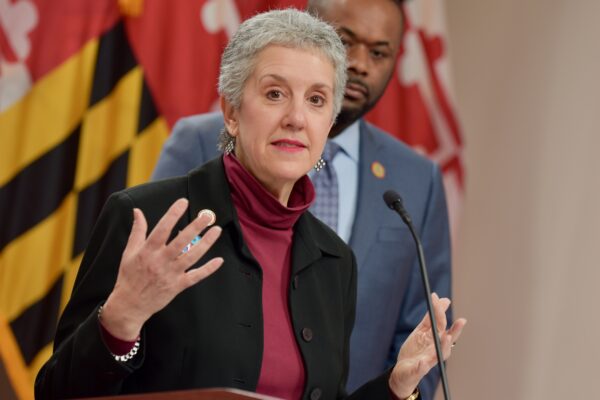
Senate Education, Energy, and the Environment Committee Vice Chair Cheryl C. Kagan (D-Montgomery). Photo by Bryan P. Sears.
“The current Republican who’s still on board, Bill Voelp has been collaborative, thoughtful, and came with a lot of experience,” said Sen. Cheryl C. Kagan (D-Montgomery), the Senate Education, Energy, and the Environment Committee vice chair and a leading voice on elections in the legislature. “It would be nice if the Republican state party sent us people in the Bill Voelp mode, who are thoughtful and experienced and who are Republicans.”
Shalleck’s nomination is on hold because he is on the May 14 Maryland primary ballot as a delegate to the Republican National Convention, supporting former South Carolina Gov. Nikki Haley, who has suspended her campaign. He cannot be formally nominated while he is a candidate.
Emails, social media posts raise questions
Butler’s nomination has been delayed since her appearance before the Executive Nominations Committee.
The delay came at the request of an unidentified committee member and after Committee Vice Chair Clarence K. Lam (D-Howard and Anne Arundel) raised questions about several emails and a social media post in which Butler was said to have compared COVID-19 mask mandates to “Nazi armbands.”
Since then, her nomination has been on ice.
“I feel like we learned a lesson last go-round,” Ferguson said. “And so, there is more scrutiny rightfully being under undertaken.”
Butler did not respond to a request for an interview.
Butler, as with other nominees to the board this year, faced tough questions about her beliefs connected to election integrity and her whereabouts on Jan. 6, 2021 — Butler said she was home cleaning a fish tank following a trip.
She also faced questions from Lam about emails and a social media post.
Those documents were not made public at the time. Some Democrats and Republicans on the nominations committee said they also had not seen them.
The emails and social media post, obtained by Maryland Matters, date back to 2021.
In one, an unnamed person raises concerns about “a very disturbing antisemitic comment in a post on a local Facebook group about requiring masks in schools.”
The author of the email was redacted. Its intended recipient was also not clear.
The post, on a Facebook group called “HOCO school interest,” references updated CDC masking guidelines.
A comment in the thread on that post from user Diane Spain Butler asks: “What’s next? Nazi armbands?”
The Facebook account appears to be associated with Butler, the elections board nominee.
Butler, during her March 12 testimony, said she could not remember the post.
“It could have been mine. You know, I think that there were a lot of different thoughts about the masks,” she said, adding that many people in the beginning of the pandemic didn’t initially believe the illness was that serious.
“We all had to go through a tremendous amount of learning curves on how we were going to deal with a pandemic of that sort,” Butler said.
In other 2021 emails, Butler writes to a state board of elections staff member raising concerns about custody of ballots, absentee balloting, and staffing.
The recipient of the email was redacted before it was obtained by Maryland Matters.
In that same May 2021 email, Butler raises concerns about budget issues and some grants Howard County and some other local elections boards received from a nonprofit associated with Facebook.
The counties won grants from the Center for Tech and Civic Life to aid elections board and increase voter participation. The center gets some of its funding from Facebook founder Mark Zuckerberg. The donations became the focus of complaints from some conservative groups following the 2020 election.
“The perception of taking money from Facebook (who is blatantly favorable of one political party over another) is alarming,” Butler writes in the email. “This should never happen. It destroys the trust of the voters in election integrity.”
In a January 2024 email exchange titled “Questions from Steve,” Butler asks a number of process and document questions as well as some about registered voter counts.
The emails end with a note from an unknown person: “It was flagged for our office that the ‘Steve’ she was asking questions on behalf of may have been related to this event.”
The email includes a photo of an announcement of a February 2024 meeting of the Howard County Republican Women’s Club featuring “Steve Brown of Howard County Voting Integrity Group.”
“The Maryland Voter Integrity Group is committed to stamping out fraud and inaccuracies in Maryland’s voter rolls to preserve voter confidence and Free, Fair and Transparent elections,” according to the group’s website.
On that website, the group alleges “serious anomalies” in four Maryland counties in the 2020 election.
The group also raised questions about the use of an “algorithm” data shows a “drop of a large number of votes at 11:15 pm on Election Day.”
In a September 2021 post, the group announced a petition for a “full forensic audit of 2020 election votes in Maryland similar to one conducted in Arizona.”
The group’s Facebook page contains numerous right-wing election tropes promoting conspiracy theories related to previous unfounded accusations of stolen elections or promoting new allegations of plans to steal the coming election.
Lam, at Butler’s confirmation hearing, asked her if she ever raised concerns about the integrity of Maryland elections or thought her emails could allow some to believe there were problems with elections.
“I think we’ve had, we’ve had so many changes so quickly. I think there are some places that we could improve,” Butler told the committee. “I think the change has to be balanced. I think the one year it was kind of sloppy and we were literally in a room and ballots were coming in and they weren’t being categorized as tightly as had been done in the past. Ours were always so good. We knew where every ballot was. And that one I think was a little bit sloppy.”
Lam asked Butler if that was enough to make her question the results of the election.
“No, I don’t think so,” she replied, adding: “We do the audits and our audits come out very good.”
For Kagan, the emails and posts raise concerns about Butler’s temperament for the election position.
“I think so many of us in our lives have been partisan activists. I have. And I think that’s fine,” said Kagan. “And for her to have been a Republican Party leader who asked hard questions is not a concern. The question is whether she can pivot and be a collaborative member of the state board of elections, and make sure that people have confidence in our election process.”
Elections appointments subject to increased scrutiny
Butler is the latest in a series of Republican nominees to the state elections board to face stricter scrutiny from the executive nominations committee.
The five-member panel is appointed by the state’s two major political parties. The party which holds the governor’s office holds three of the five board seats.
Nominees for the elections board are selected by the state Democratic and Republican parties. The parties then submit the names to the governor, who, in most cases, forwards them on to the state Senate for confirmation.
Moore’s election in 2022 ensured Democratic majority control the board for the first time in eight years.
Since then, Republican nominees to the board have run afoul of the appointments process and prosecutors. Butler represents the fourth nominee selected by the party to fill its two elections board seats since Moore took office.
Last year, Moore nixed the Republican Party’s nomination of William T. Newton to the state elections board, saying the perennial candidate for office “does not meet our internal vetting standards.”
The governor cited Newton’s recent history of challenging the outcome of the 2020 election. He also cited a guilty plea involving “a crime of moral turpitude.”
Newton pleaded guilty in 2019 to charges of misdemeanor embezzlement in a case involving his mother. Newton was sentenced to probation before judgment contingent on paying $16,495 in restitution in installments of $100 per month.
Following Newton, the Senate Executive Nominations Committee rejected the nomination of Christine McCloud, a Howard County hypnotherapist whose election experience was limited to working for one candidate at a poll in the prior election. The committee cited concerns about McCloud’s voting record, which included voting in only one primary and four general elections since 2010.
Michelle Ewing, a Republican nominee to the Talbot County elections board, withdrew after it became apparent that she too would not be recommended for confirmation by the Senate committee.
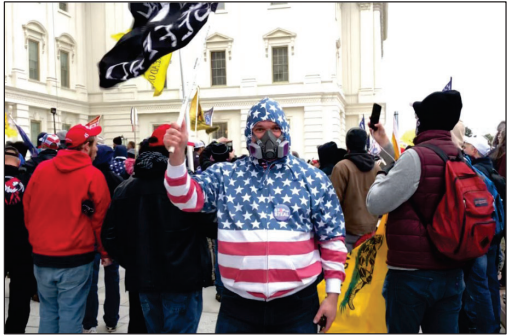
Federal prosecutors say this image shows Carlos Ayala on the Upper West Terrace at the U.S. Capitol on Jan. 6, 2021. Ayala was subsequently appointed to and resigned from the Maryland State Board of Elections. Image from court documents.
Ayala’s formal accusation by the Justice Department rocked the committee and senators such as Kagan, who found no issue with him either in his testimony or social media footprint.
It was enough to cause Ferguson and Executive Nominations Chair Antonio Hayes (D-Baltimore City) to insist that a new litmus test would be used to vet future elections nominees.
Earlier this year, State Elections Administrator Jared DeMarinis, and Yaakov “Jake” Weissman, a Democratic Party nominee for a board seat, were asked about their beliefs in the integrity of Maryland elections as well as their whereabouts during the insurrection in D.C.
Butler has a varied background, including eight years on the Howard County Board of Elections, where she served until June 2023.
On her LinkedIn resume, she lists her current occupation as a contract employee “supervisor-troubleshooter” for the Washington, D.C.-based National Association of Educational Progress.
The Ellicott City resident and home school teacher served on the county’s Republican Central Committee from 2008-2014.
She also lists membership in the Screen Actors Guild as an actor, stand-in for Lynda Carter and stunt double.
Butler unsuccessfully ran for Howard County Board of Education in 2008. She complained that an opponent portrayed her negatively as a “home school teacher who wanted to teach creationism and religion” in public schools.
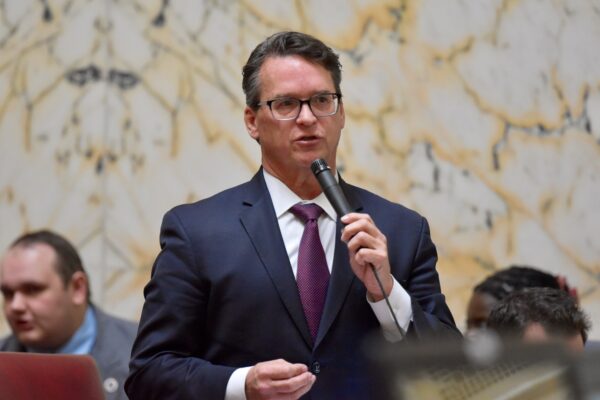
Senate Minority Leader Stephen S. Hershey Jr. (R-Upper Shore). Photo by Bryan P. Sears.
Years later, she founded Responsible and Educated Drivers, an organization focused on discouraging texting while driving. She started the group in response to a car crash that severely injured her then 16-year-old daughter.
Hershey said he thinks the problems with recent party nominees has stressed the importance of proper vetting.
“I think what happened last year sent that message, and we were able to reiterate that message,” said Hershey. “As the Senate president said, two were not approved and one was, one was withdrawn. And then the issue that we had with Mr. Ayala. I think that message is very strong that these have to be vetted at the state party level first, because of the intense scrutiny that they’ll go into.”




 Creative Commons Attribution
Creative Commons Attribution